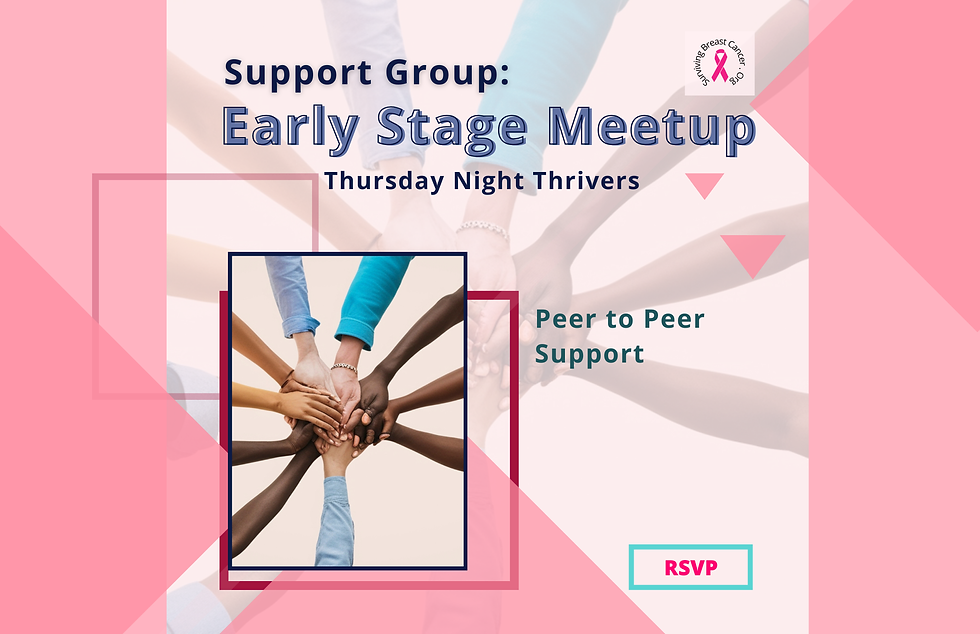Breast Cancer and Healthcare Access Within the Hispanic Community
- Surviving Breast Cancer

- Sep 15, 2023
- 3 min read
Updated: Oct 9, 2025
By Kiara Ford

In recognition of Hispanic Heritage Month this September 15 to October 15, now is the time to reflect on how breast cancer affects the Hispanic community, and the unique challenges that are often left unaddressed for Hispanic people with breast cancer.
It has been well established that the likelihood of a breast cancer diagnosis can be determined by one’s genetic background and is often linked to race. This presents challenges when attempting to study and understand how breast cancer specifically impacts the Hispanic community, as Hispanic people are not a homogeneous group and can be of any race. Historically, breast cancer research has failed to address this diversity within the Hispanic population. In fact, most research about breast cancer is based on studies of non-Hispanic white women.
That being said, some broad generalizations can be surmised from studying the Hispanic population as a whole. Recent data show that Hispanic women are about 30% less likely to be diagnosed with breast cancer than non-Hispanic white women. Although this statistic sounds hopeful, it is also true that Hispanic women are more likely to be diagnosed younger, with more aggressive types of breast cancer, and are more likely to be diagnosed at a later stage. Although breast cancer may be less common among Hispanic women, they are 30% more likely to die from their breast cancer than non-Hispanic white women, with breast cancer being the leading cause of cancer deaths among Hispanic women.
Screening Accessibility
Part of the issue, particularly as it pertains to timely diagnoses, is caused by a lack of access to mammograms. Regular mammograms are essential to catch cancer early, but a 2019 study from the Centers for Disease Control and Prevention found that only 64% of Hispanic women over age 40 had had a mammogram within the past two years. This low figure is linked to a number of social factors, one of the biggest being the inability to make it to an appointment.
Although mammograms are quick screenings, they can often only be scheduled during typical business hours, when women might have to miss work and potentially lose a paycheck in order to get them. They might also have to arrange childcare – another financial burden – and organize transportation to these appointments. These disruptions in work and family obligations create a financial barrier to mammogram access for Hispanic women, yet the consequences of missing a mammogram can be costlier.
Access to screenings is just one example of how social determinants of health impact Hispanic people seeking cancer care. Another such example is diet and nutrition. Maintaining a diet rich in fruits, vegetables, and whole grains can help lower an individual’s risk of developing breast cancer. Systemic lack of access to healthy food options is believed to be a compounding factor in breast cancer rates among Hispanic women.
Language Barriers
Language access presents yet another challenge. In the United States, much information about breast cancer is written in English only, so a patient whose primary language is Spanish may find a lack of resources and cultural competency within their treatment. It should be noted, however, that Title VI of the Civil Rights Act of 1964 includes provisions for limited English proficient (LEP) individuals receiving healthcare services and information so that they receive information and communications from their providers in a language they understand. This includes a requirement for professional healthcare interpreters to be provided at medical appointments when requested. Written materials must also be professionally translated and provided to patients.
Health Insurance Disparities
Finally, there is the issue of insurance. The U.S. Census Bureau has found that Hispanic people have among the highest uninsured rates in the nation. A lack of insurance makes it far more challenging to access preventative care and catch cancer early.
These are just a few examples of the numerous factors shaping the health of Hispanic people, which are not currently adequately addressed. The solution to these issues will be complex, but one of the first steps is raising awareness. Understanding that Hispanic women face a unique set of obstacles in receiving cancer screening, information, treatment, and insurance coverage is necessary to ensure equity in healthcare and beyond.
SurvivingBreastCancer.org Spanish Language Resources & Support:
About the Author:

Kiara Ford is a recent graduate of Emerson College, where she majored in communication studies and minored in health and society. She is currently a community health worker trainee with the non-profit organization Asian Women for Health. She is passionate about patient advocacy and health equity, and hopes to raise awareness and increase understanding of patients’ rights through her work.










